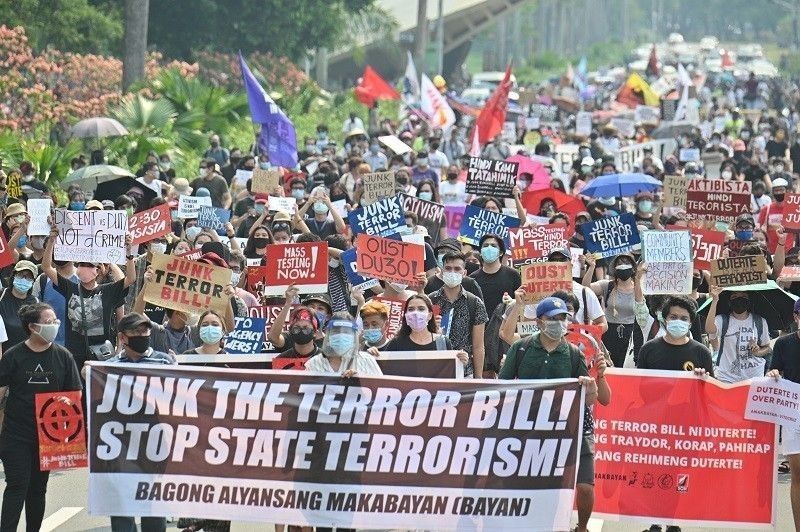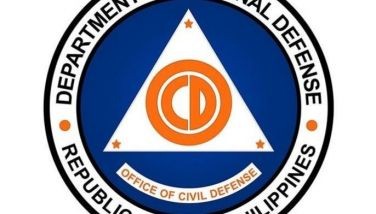Petitioners tell SC, OSG: Canceling oral arguments on anti-terrorism law 'disservice' to public interest

MANILA, Philippines — Progressive groups led by BAYAN and a group of Sangguniang Kabataan leaders urged the Supreme Court to hold oral arguments on the petitions filed against Anti-Terrorism Act of 2020 to allow the public to participate in discourse on the contentious law.
In a Joint Opposition filed Monday, through the National Union of Peoples Lawyers, the two groups of petitioners asked the SC to junk the Office of the Solicitor General’s motion to cancel the oral arguments on the petitions.
READ: SC to hold oral arguments for petitions vs anti-terrorism law | Solgen to SC: Oral arguments on anti-terror law unnecessary, unsafe due to pandemic
On official SC list, BAYAN filed the 11th while the SK officials and youth community leaders filed the 27th legal challenge against Republic Act 11479. Two more petitions filed via registered mail have yet to be received and docketed by the SC.
Solicitor General Jose Calida in August urged the SC to cancel the oral arguments, citing its risk and impracticality in this time of COVID-19 pandemic. Calida instead said the SC may order the submission of memoranda, clarificatory questions and written opening statements to the parties.
Matters of public concern
The groups told the court that the number of petitions filed against the law “only indicates the transcendental importance of these cases.” They added that arguments raised in the petitions center on issues that are matters of public concern.
“Cancelling the oral arguments will be a disservice to the overwhelming public interest in these cases,” the petitioners stressed.
“The public have the right to examine and discuss how respondents assisted by the OSG will defend the odious law,” they added.
The petitioners mounted a “facial challenge” against RA 11479. They argued that Section 4 of the law, which defines terrorism, fails to inform an ordinary citizen that his or her act may be deemed a criminal offense under the law. “The term is so vague and overbroad, it encroaches even upon constitutionally protected freedoms,” they added.
Opting for the alternatives proposed by the OSG, such as submission of memoranda, would deny the public the opportunity to take part in the “democratic discourse” on the case, the petitioners also said.
READ: Cheat sheet on the looming legal battle on the anti-terrorism law
They also pointed out that the SC has adjusted to the situation brought about by COVID-19, based on the various memoranda it put out while the country remains in continued quarantine.
They noted that even when Metro Manila was placed in the strictest quarantine protocols, the courts continued to function and shifted to conducting videoconferencing.
“Respondents, therefore, cannot now undermine the ability of the Honorable Court to conduct oral arguments in a way that balances the overriding public interest in these cases and the safety of the parties, their counsels, and the Court’s members and staff,” they added.
“If courts in remote areas have been successful in conducting hearings online, there is no reason why the same cannot be done in Manila,” they said.
“Interestingly, for the proponents of a law that has been so ‘unfairly stigmatized,’ Respondents are averse to throwing light on the same through the oral arguments. It seems that by refusing to be subjected under public scrutiny, Respondents intend to obscure the law, which operates in the shadows,” the petitioners added.
The SC, in an en banc session on August 11, set the petitions for oral arguments, but a date has yet to be determined. The tribunal has also yet to announce whether the oral arguments will be held in-court or via videoconferencing.
President Rodrigo Duterte signed the Anti-Terrorism Law on July 3 despite opposition from rights groups and civil society groups that it could be used to stifle human rights.
A petition against the law has been filed at the Supreme Court and other groups are preparing pleadings of their own.
Follow this page for updates. Photo courtesy of The STAR/Michael Varcas
National Security Adviser Hermogenes Esperon moves to block access to several websites, including news sites of alternative news orrganizations Bulatlat.com and Pinoyweekly.org.
In his letter to the National Telecommunications Commission, he only says the websites are "affiliated to and are supporting these terrorists and terrorist organizations."
No other basis to back up his allegation was cited in the letter.
Citing the designation of the CPP-NPA-NDF as terrorists, NSA Hermogenes Esperon moves to block access to several sites.
— Kristine Patag (@kristinepatag) June 22, 2022
In Esperon's letter to the NTC, he included news sites @bulatlat and @pinoyweekly; sites of other progressive groups RMP and Save our Schools. @PhilstarNews pic.twitter.com/nAzMITJFsS
The Commission on Human Rights says it "partly welcomes" the Supreme Court decision that some parts of the controversial Anti-terrorism Law are unconstitutional.
CHR spokesperson Jacqueline de Guia says the commission remains hopeful that the remaining contentious provisions of the law will be clarified by the high cour in the full text of the decision.
"At the same time, our commitment remains in guarding against possible human rights violations arising from the implementation of the anti-terror law. We steadfastly remind the government that countering terrorism and protecting human rights are not competing values but are, in fact, mutual and complementary," De Guia says in a statement.
The Supreme Court has deliberated and voted on the controversial Anti-Terrorism Act but the decision will be released "at the soonest time possible."
"However, considering that there were numerous issues resolved in the case, as well as the fact that each Justice had to vote on each issue, there is a need to accurately confirm and tally the vote of each Justice in order to ensure the correct resolution of the Court per issue," SC spokesperson Brian Hosaka says.
The Anti-Terrorism Council designates the National Democratic Front of the Philippines, the panel that negotiates for communist rebels during peace talks a terrorist organization.
Previous designation of the Communist Party of the Philippines and New People's Army led to the designation of supposed members of the CPP's Central Committee. Among those designated as terorrists were peace consultants.
Designation gives the Anti-Terrorism Council the authority to investigate and freeze the accounts of designated persons.
The Anti-Terrorism Council has designated 29 people, including alleged members of the Communist Party of the Philippines-New People's Army, as terrorists in two resolutions.
Designation allows the Anti-Money Laundering Council to freeze the assets of those on the list.
- Latest
- Trending






























